Cyrano (2021) is a movie adaptation of a 2018 stage musical which was itself based on Edmond Rostand’s 1897 tragic comedy-or comic tragedy-Cyrano de Bergerac. I’d better state upfront that this is going to be one of those blog posts where I can’t explain my opinions about the adaptation without giving away practically the entire plot of the original story, so anyone unfamiliar with Rostand’s masterpiece should really stop reading right now and go experience it first. I recommend the 1950 English-language movie starring Jose Ferrer, which was my introduction to the play.[1]Actually, my introduction was an episode of Wishbone, but I’d forgotten about that by the time I saw the 1950 movie. If you’d prefer to experience it in the original language, there’s the 1990 film starring Gerard Depardieu. Or you could always just read Edmond Rostand’s script itself. If, like me, you don’t speak French, the best English translation I’ve found is the one by Brian Hooker. Mind you, I can’t say if it’s the most accurate but if it’s not, it must have improved upon what it was translating.
You’ll notice I haven’t recommended watching Cyrano (2021) itself as an introduction to this story.
Yep. This is going to be one of those posts.
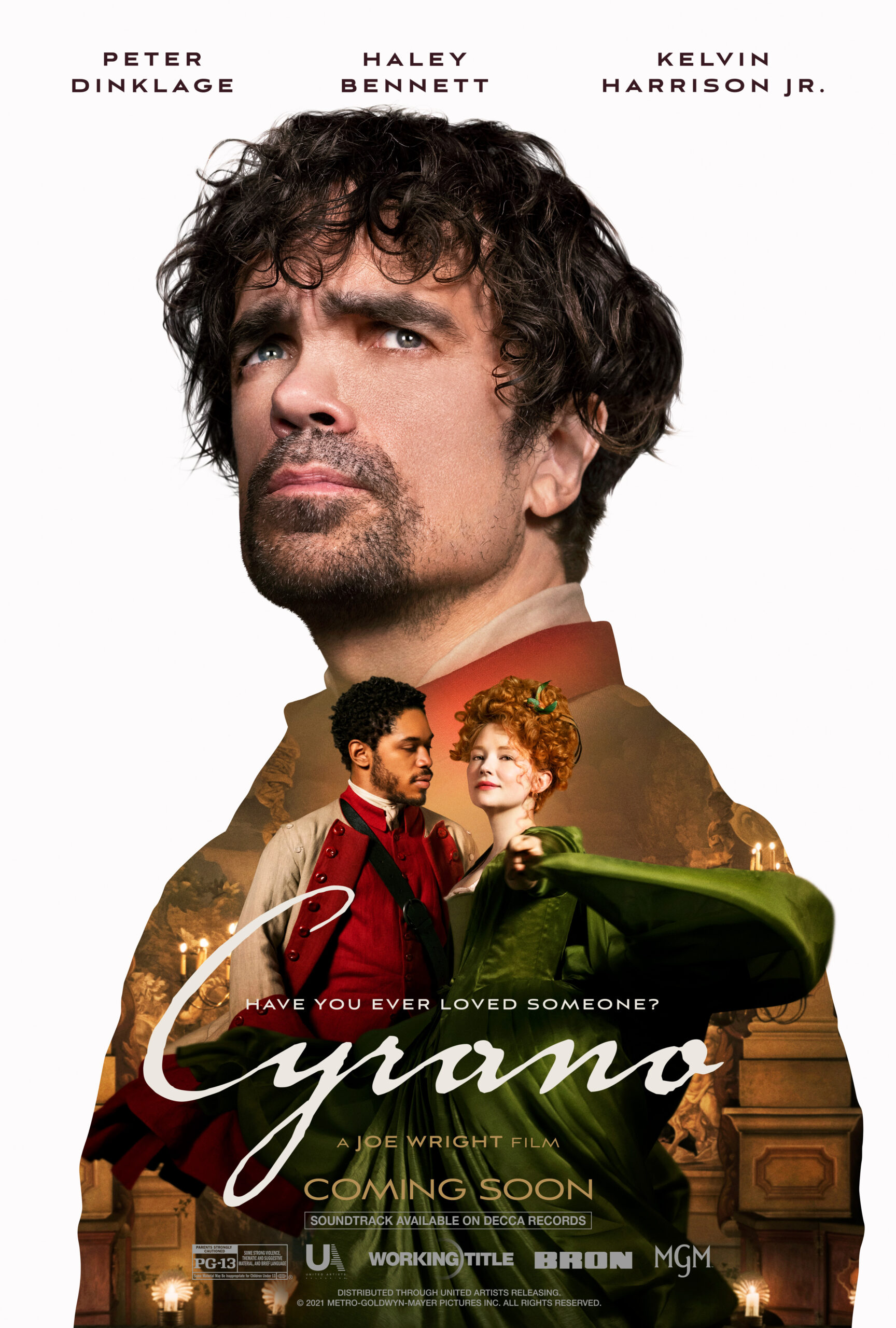
Cyrano starts by annoying me right off the bat. The scene is Paris circa 1640. The beautiful Roxanne (Haley Bennet) is getting ready to attend the theater with the villainous Duke de Guiche (Ben Mendelsohn.) Her servant/chaperone, Marie (Monica Dolan), urges her to marry him but she protests that she doesn’t even like him, let alone love him. Marie reminds her that she’s running out of money. “A clever marriage is your only option,” she says. Argh! Does every period piece have to include a version of this scene? I’m not saying none of them should do so. Both the 1995 Sense and Sensibility and the 2019 Little Women have the female characters lament that marriage is the only way they can get financial security in their culture and those are both wonderfully written adaptations.[2]As I’ve written before, I don’t find the movies themselves that fun to watch but their screenplays (by Emma Thompson and Greta Gerwig respectively) are great. One of my favorite movies/musicals, Fiddler on the Roof, has a whole song (Matchmaker) on the topic. But with each of those movies, the topic actually relates to the classic story being retold. By contrast, Roxanne’s financial status is never an issue throughout the rest of Cyrano.[3]To be fair, it was developed a bit more in the screenplay as written as was the character of Marie. But that was cut from the final film. The opening conversation serves no purpose but to make the movie needlessly cliche. Sure, feminists may appreciate the movie acknowledging the historical hardship faced by women, but you know what feminists might also appreciate, possibly more so? A period piece where the heroine is a powerful figure who can marry whatever man she chooses.[4]The 1950 movie made a better attempt to make the material more feminist by having Roxanne explain to Cyrano why she demands her lover be both handsome and eloquent thus: “You men own the world … Continue reading

At the theater, we meet our hero, master poet/swordsman Cyrano de Bergerac (Peter Dinklage, husband of Erica Schmidt, who wrote the movie and the stage musical.) The musical’s biggest twist on the original play is that instead of having a ridiculously big nose, Cyrano’s big physical defect is that he’s a little person. I’m sorry but I fail to see the appeal of this. It changes the tone of the story since dwarfism is a real reason a man would feel like a conventionally attractive woman could never love him. Nothing wrong with stories about serious real-world problems, of course, but what was wrong with the story being “a heroic comedy” as Rostand intended? Was it just so Dinklage could play the character? That’s not the worst reason since he’s the movie’s biggest asset. But why not have Cyrano be both a little person and have his traditional deformity?[5]Well, one reason might be that it’s arguably important that the thing keeping Cyrano from being handsome or at least not unhandsome is technically small. It’s his vanity more than his … Continue reading Is Dinklage just too big an actor to wear a gag nose?
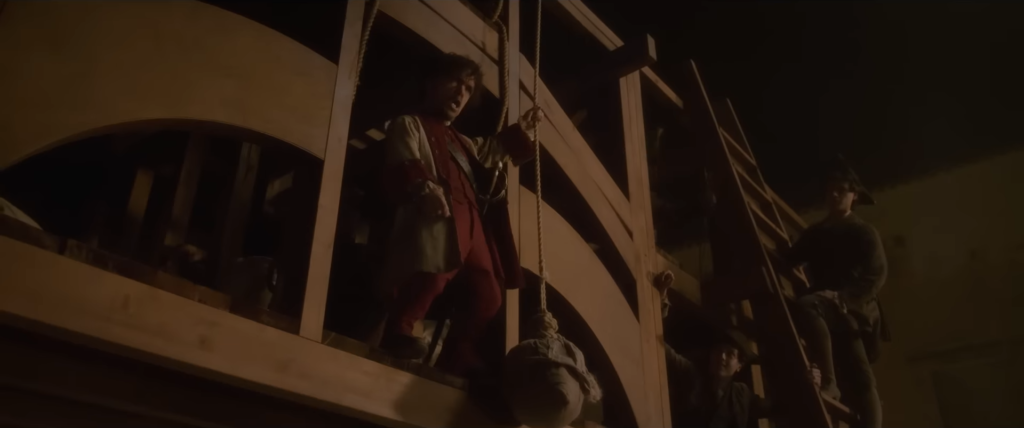
Maybe I could respect the choice if this Cyrano really felt like it was trying to be a grittier, more realistic and grounded version of the story. But with its modern sounding dialogue[6]The mindsets of the characters are also, more or less, modern compared to those in the original play., the caricatured performances of most of the supporting cast and the cheesy musical numbers, this movie doesn’t really feel like it’s avoiding goofiness.

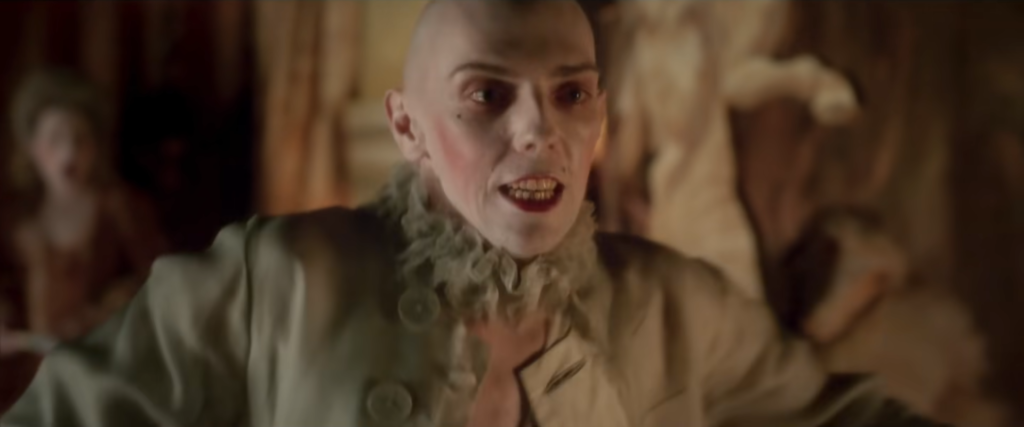
How can I complain about the musical numbers in this movie when I love the ones in Les Misérables (2012), another modern movie adaptation of a stage musical based on a classic work of French literature, especially since it’s one that’s darker and grittier than Cyrano de Bergerac? Shouldn’t they be more of a hindrance to taking that story seriously? Likely, it’s an innate advantage of a sung-through musical over a non-sung-through musical. Since (almost) every scene in Les Misérables is a song[7]This is not as true of the movie version as of the stage musical but it’s close to the truth., it’s easier to get used to it and accept that this is a world where people sing all the time instead of talking. With the characters in Cyrano and other such musicals alternating between singing and speaking, it’s more jarring.[8]I know this isn’t a universally held opinion and there are viewers who feel Les Misérables didn’t need to consist entirely of songs. What can I say? Those viewers aren’t writing … Continue reading I think it also might be because there’s lots of singing in Les Misérables but barely any dancing, so it doesn’t try to make bakers baking bread a metaphor for sexual desire or have a training session for a garrison of soldiers turn into a ballet or show characters rubbing love letters against their skin like they’re making out with them.
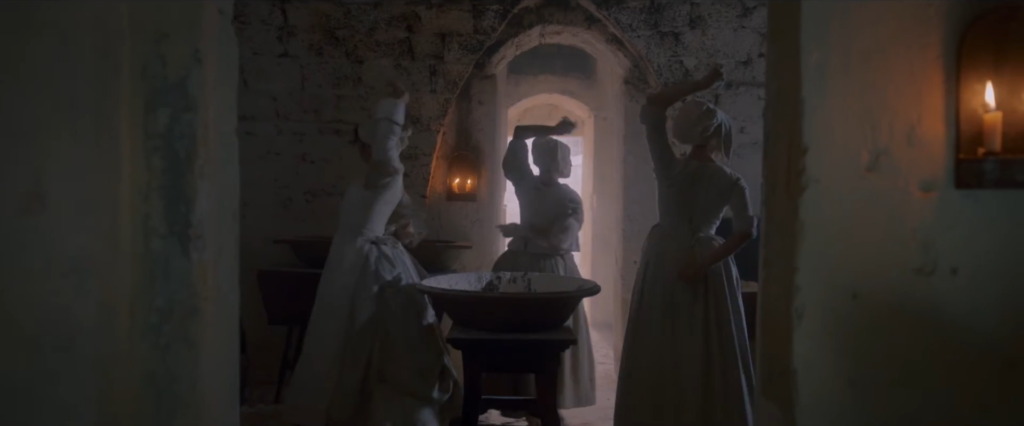
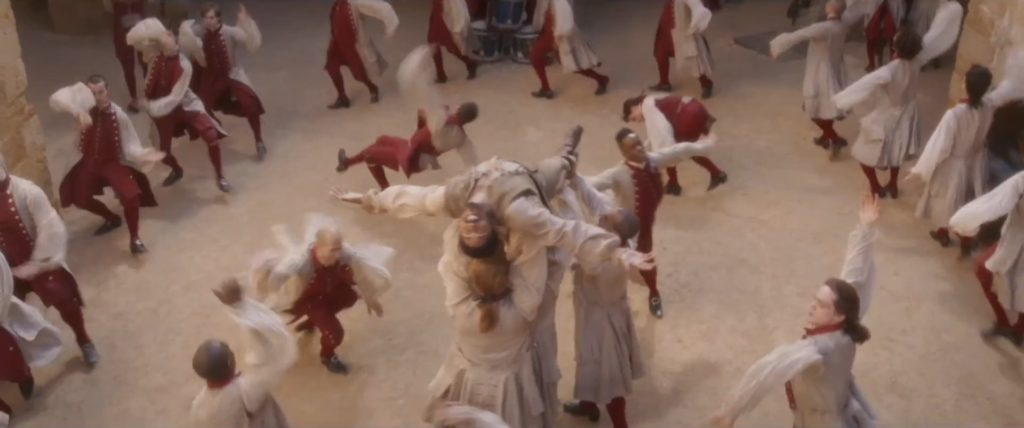
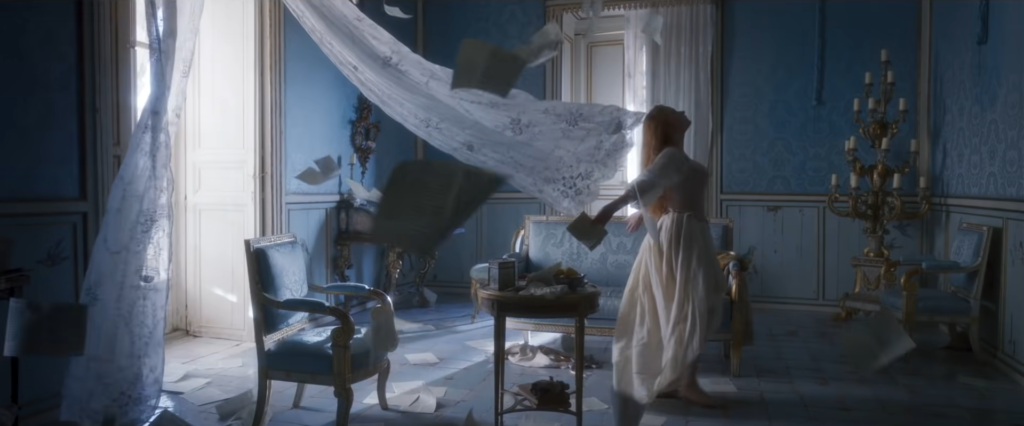
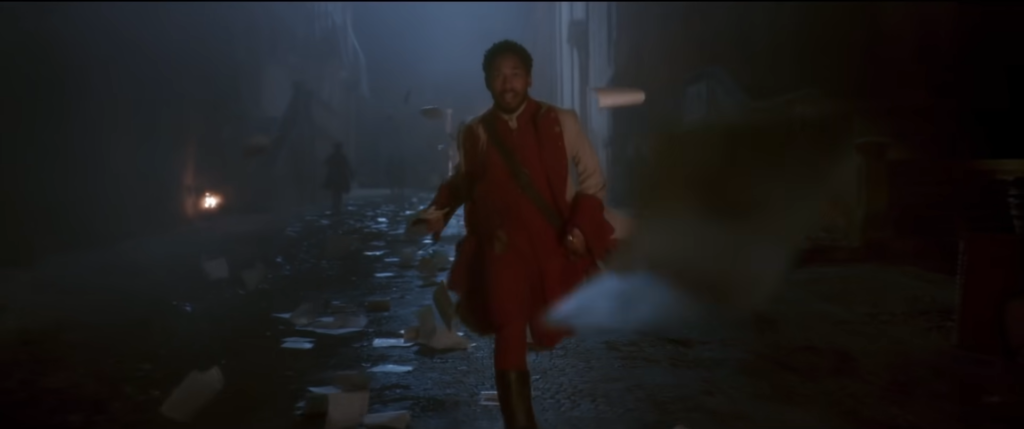
But I suspect the main reason is that Les Misérables‘s songs are just much better than the ones lyricists Matt Berninger and Carin Besser and composers Aaron and Bryce Dessner wrote for Cyrano. Maybe I was overly harsh to call them cheesy, but I can’t give any of them a more positive description than “pleasant.” The one that comes closest to being memorable is Heaven Is Wherever I Fall, in which various soldiers about die reminisce about their loved ones. It’s a problem when the most moving song in your musical is all about background characters.
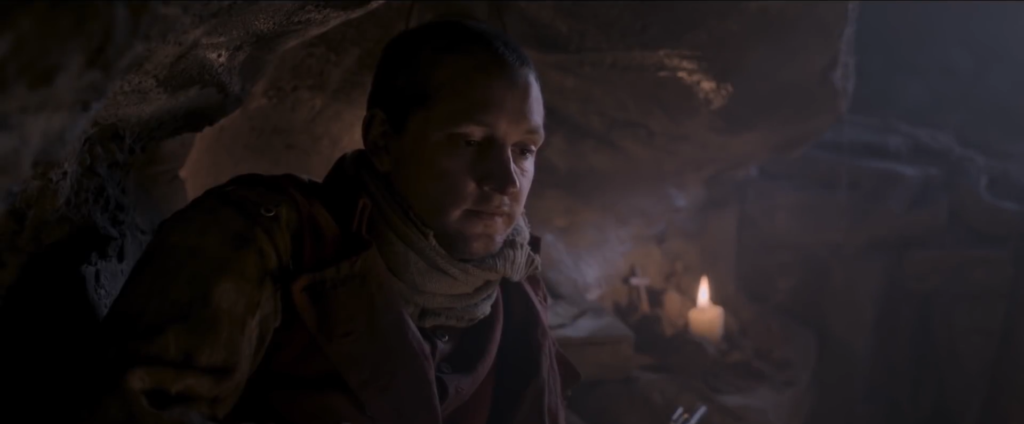
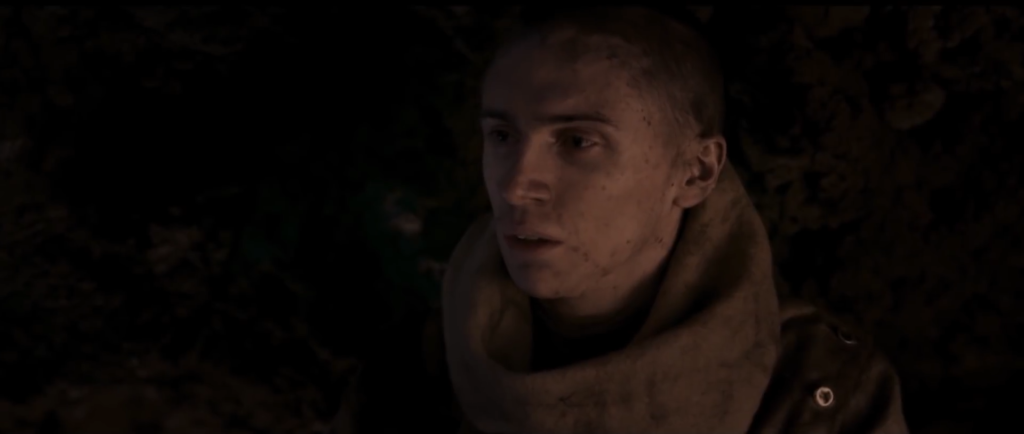
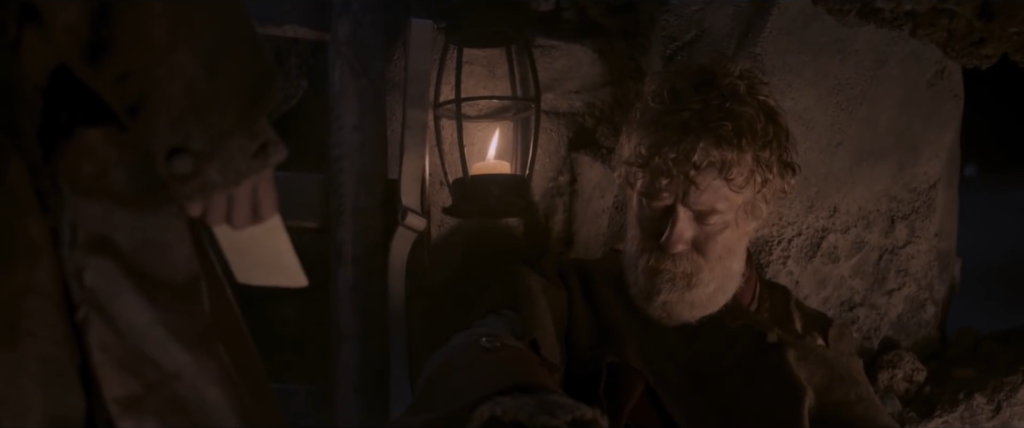
The movie may not entirely dispense with the original play’s often whimsical tone, but it frequently bungles what made its comedy work-or its drama work for that matter. (This is the part of the blog post that will really spoil a first viewing experience, so if anyone newcomers haven’t bailed out yet, now is the time.) Early in Rostand’s version, Roxanne confides in Cyrano, her cousin,[9]The 2021 has them be old friends to reduce any squickiness. Remember what I mentioned about the characters being modernized. that she and a handsome new recruit in his regiment, Christian de Neuvillette (Kelvin Harrison Jr in this movie) are in love though they have never spoken. She asks him to protect the man, not realizing that Cyrano is secretly in love with her himself. Later, to impress the other cadets who are hazing him, Christian insults the infamously touchy Cyrano’s nose. Cyrano is about to literally kill him when he’s told his name and immediately restrains himself for Roxanne’s sake. But, as Cyrano is recounting a story, Christian keeps making nose puns. Finally, Cyrano explodes and orders everyone else out of the room. The audience and most of the characters expect the worst but once Cyrano is alone with Christian, he embraces him and says he’s glad the man Roxanne loves is so brave. The musical simplifies this scenario to the point that it’s only a fifth as funny and not a tenth as suspenseful. Later, while it keeps Cyrano being told to stall the predatory De Guiche until Christian and Roxanne have wed, the movie completely removes the sequence of him posing as a lunatic who claims to have been to the moon.[10]An allusion to the actual writing of the historical Cyrano. Why?!
In the original play, not only did Roxanne sneak past enemy lines to be with Christian on the battlefield and possibly die with him but she smuggled in a feast for the starving French troops. Like Anthony Burgess’s 1970 English translation, this movie dispenses with all that, presumably because it’s not realistic.[11]In his defense, Burgess did later revise his translation to be closer to the text. Again, with the realism thing? This story isn’t supposed to be realistic. It’s supposed to be fun. And when so many modern adaptations strain themselves trying to make the heroines more proactive, it’s bizarre to see this one make her less so, especially since it sometimes seems like it’s trying to offer a female perspective on the material. (When De Guiche admiringly says that only a woman could suggest a plan of revenge such as the one she, for secret purposes of her own, has given him, she retorts that “only a man could think so.”) Instead of having Roxanne being physically present to tell Christian she now loves him for his “soul,” not his looks, the musical has her tell him this in a letter. Since Cyrano has been the one ghostwriting all of Christian’s love letters and feeding him all his romantic lines, Christian realizes this means it’s truly Cyrano Roxanne loves, and he’s already realized Cyrano loves her. He insists Cyrano tell her the truth and that their unconsummated marriage be annulled if she wishes it. In Rostand’s version, this leads to Cyrano questioning Roxanne as to whether she’d really love Christian if he were ugly, hardly daring to believe this. When she insists it’s true, his hopes rise and he’s about to confess, when he’s informed that Christian is dying. Unwilling to let him die unmourned by Roxanne, he resolves to keep up the deception. Of course, in the movie, there is no Roxanne present so there are none of the rising and falling hopes that make the scene so dramatic. No sooner has Christian insisted that Roxanne be told the truth than he is killed. What’s more, Cyrano’s decision not to tell Roxanne, which was already hard to understand in the original, becomes completely baffling here. Since Christian’s last wishes were that Roxanne know all, not telling her seems disrespectful to him as well as brutally unfair to her. The whole ending becomes boring in its bleakness rather than satisfyingly tragic.[12]This excellent LiveJournal post about the Anthony Burgess translation makes many of the same points I am making.
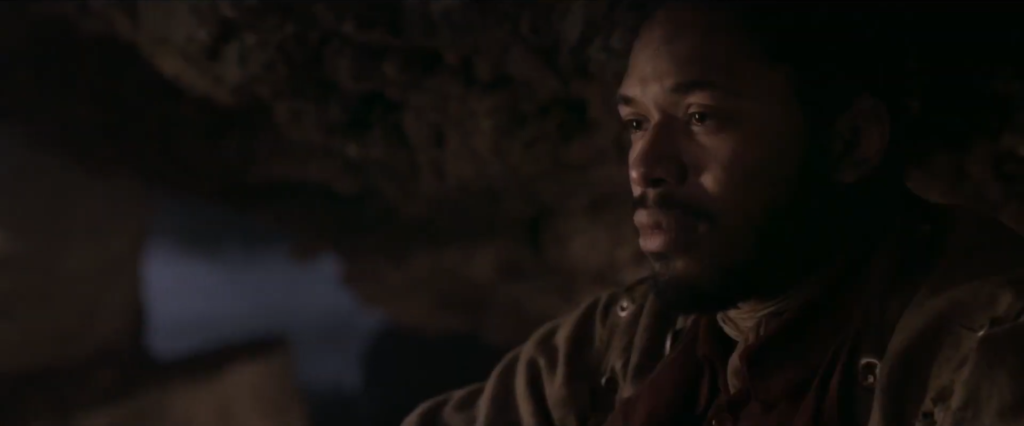
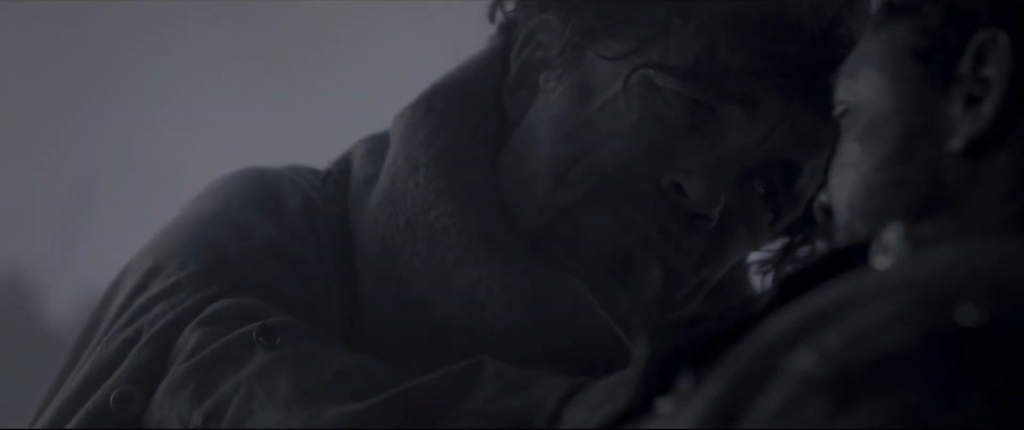
Having said all that, I’m going to give this movie a mild recommendation. Why?
Well, the dialogue may not be Rostand, but it is generally fun and engaging and it retains enough of his ideas to be interesting. Director Joe Wright (Anna Karenina, Pride and Prejudice) makes the movie look good even if he doesn’t have the best taste in scripts. I love the staging of Christian’s one attempt to woo Roxanne with his own words with the two of them staring down from a great height in keeping with his feelings of panic. Bennet and Harrison are appealing in their roles. But it’s Dinklage who really saves the film. His tough, scrappy Cyrano vividly conveys having had to fight for people’s respect his entire life. Yet when he speaks with Roxanne-or even just speaks of her-the vulnerability in his eyes can break your heart.
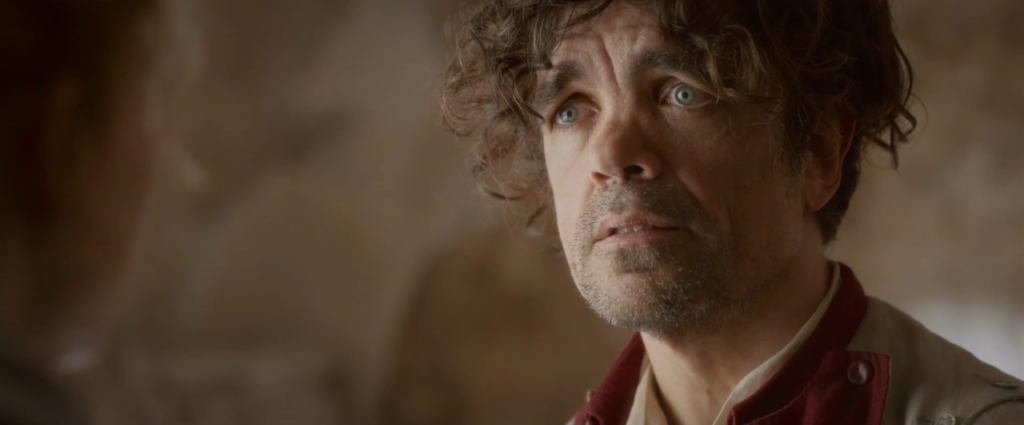
Even burdened with a boring song, he shines in the classic scene of Cyrano impersonating Christian in the dark, expressing his real feelings for Roxanne for once.
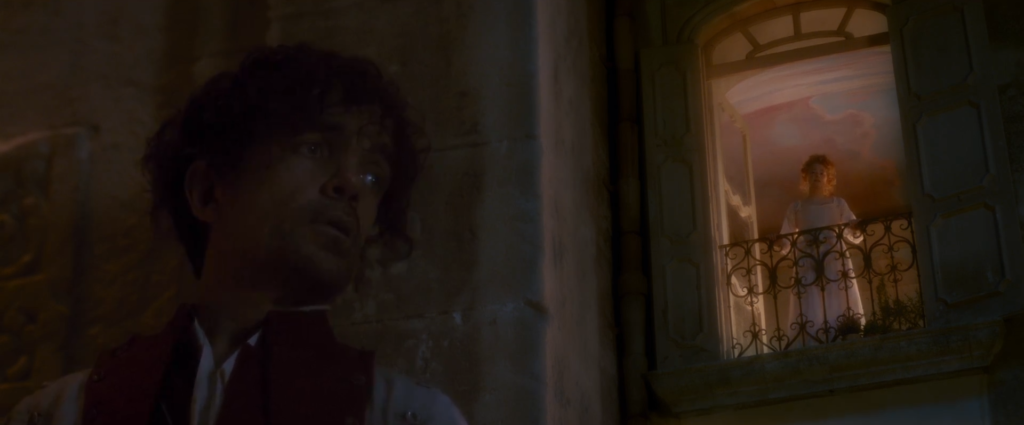
I’ve claimed that the changes this adaptation makes to the climax ruin the ending, but Dinklage and company still manage to make the last scene a powerful tearjerker.

I’d still recommend any of the versions of this story I mentioned in this post’s first paragraph over this one. But if, after partaking of them, you become a fan, it wouldn’t hurt to check this Cyrano out too.
Happy Valentine’s Day, everybody!
References
| ↑1 | Actually, my introduction was an episode of Wishbone, but I’d forgotten about that by the time I saw the 1950 movie. |
|---|---|
| ↑2 | As I’ve written before, I don’t find the movies themselves that fun to watch but their screenplays (by Emma Thompson and Greta Gerwig respectively) are great. |
| ↑3 | To be fair, it was developed a bit more in the screenplay as written as was the character of Marie. But that was cut from the final film. |
| ↑4 | The 1950 movie made a better attempt to make the material more feminist by having Roxanne explain to Cyrano why she demands her lover be both handsome and eloquent thus: “You men own the world and all that is in it. Woman is at best a prize, a property valued much the same as a horse or a dog…If I must be chattel, then the terms shall be mine and the price according to my own values.” |
| ↑5 | Well, one reason might be that it’s arguably important that the thing keeping Cyrano from being handsome or at least not unhandsome is technically small. It’s his vanity more than his actual appearance that hurts him. |
| ↑6 | The mindsets of the characters are also, more or less, modern compared to those in the original play. |
| ↑7 | This is not as true of the movie version as of the stage musical but it’s close to the truth. |
| ↑8 | I know this isn’t a universally held opinion and there are viewers who feel Les Misérables didn’t need to consist entirely of songs. What can I say? Those viewers aren’t writing this blog. |
| ↑9 | The 2021 has them be old friends to reduce any squickiness. Remember what I mentioned about the characters being modernized. |
| ↑10 | An allusion to the actual writing of the historical Cyrano. |
| ↑11 | In his defense, Burgess did later revise his translation to be closer to the text. |
| ↑12 | This excellent LiveJournal post about the Anthony Burgess translation makes many of the same points I am making. |

Hey Mr. Adaptation Station, you must organize and categorize your content! I’m actually gaining an interest in your site, but if you want me to explore and hopefully see the best you have to offer, you have to make it easy for people like me!